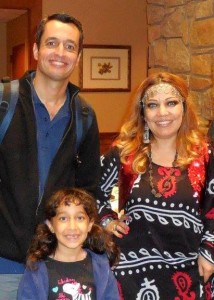Five Questions with Dilshad Jaff
Dilshad Jaff believes mentoring and music bring people together.

Dilshad (left) presents at a meeting of the Cary-Kildaire Rotary Club. He is accompanied by his wife, dressed in a traditional Kurdish costume, and their daughter. (Contributed photo)
Name: Dilshad Jaff
Position: Advisor for conflict and disaster prevention research, Gillings Global GatewayTM
Years at Gillings: 2.5 (I began the Master of Public Health program in August 2013 and started my staff role with the Gateway in July 2015.)
What I do at Gillings (and why I love it): My position was created by the School because the world is seeing more and more conflicts – war, outbreaks and natural disasters. Ebola and the current refugee crisis are two examples of how complex and evolving these situations can be. I work to help public health professionals gain a better understanding of the facts and realities of crisis events so they can better intervene and address them.
The environment at the Gillings School is very supportive, and this gives me the courage and motivation to explore innovative ways to connect public health and conflict settings. People at UNC, from different Schools and disciplines, are all so willing to talk about this topic. They recognize its importance and intersectionality. But what I love most of all is supporting students who want to do this kind of work. Before coming here to get my Master of Public Health degree, I spent 13 years as a doctor in the field. Mentoring students, helping them connect their studies and fieldwork opportunities, brings me great joy.
Editor’s note: Listen to stories from Dilshad’s time working in refugee camps in the third episode of the podcast Public Health Behind the Scenes.
My first job ever: On Oct. 31, 2000, I walked into my first day of work as a brand-new doctor in a town I didn’t know. I didn’t hold any jobs at a younger age because I was entirely focused on my studies. When the time came for the standardized test at the end of secondary school, I scored high enough that I could choose to attend any School at any university in Iraq. I’d contemplated becoming an engineer because my older brothers were all in that field, but when my test score provided the opportunity to pursue medicine I thought, “Well, let me try it.” I studied for six years and completed a two-year residency, and then the Ministry of Health assigned me to a hospital in a part of the country I’d never visited.
The best advice I ever received: First, I want to say that the faculty members at this School are excellent sources of guidance. They care so much that they truly feel like family to me. But the very best advice I ever received came from my mom and dad, a long time ago. In my personal view, when you live in a developing country, becoming a doctor can make you very wealthy and possibly lead you to become arrogant as well. My parents used to say, “You must always treat people in need for free. If someone is standing in front of you, hurting, don’t look into their background or their ability to pay. Just take care of them.” They also told me to always have a global perspective, because while your local environment grounds you, people around the world are all the same at heart. This desire to treat all people in need, not just in my country, is what led me to humanitarianism and my current role.
I also have to thank my wife, who is always supportive. Without her and our daughter, I never could have achieved what I have up to this point. She has been at my side throughout all my journeys.
If I could wake up with one new ability, it would be: A talent for playing traditional Kurdish musical instruments. I am a Kurd from the north of Iraq, and we have beautiful instruments like the saz and the santur. There is a Kurdish woman named Tara Jaff who plays folks songs, many about nature and peace, on a traditional harp. She reminds me that music is another way to bring people together and share culture. I would choose to play these traditional instruments because they existed long before the technology we have today. People used to communicate through them, and we shouldn’t let that history fade away.
The book I am reading right now is: Chasing Misery: an anthology of essays by women in humanitarian responses. It shares essays written by women out in the field, doing front-line humanitarian work, and is so honest about their hopes, fears and challenges.
I personally can’t sleep at night if I don’t read – that means every night, everywhere I go. I mostly read on my Kindle, which is loaded with books on psychology, culture and humanitarian work – all nonfiction. These are the things that relate to my life. When I was younger, my father had books of this nature, and we actually had a certain spot in the garden where we would hide them whenever houses in the neighborhood were being searched. At the time, having that kind of book could get you in big trouble. When I first started reading my father’s books, I didn’t understand a lot of the messages, but now I think they helped me be more open and understand other cultures much better when I started traveling.
